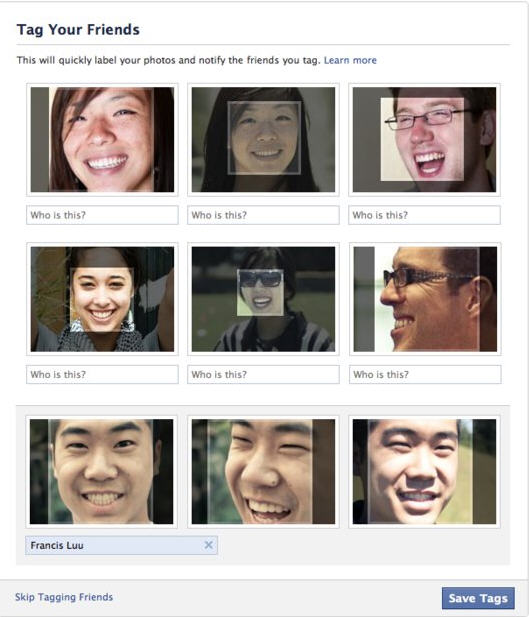
Facebook will employ face recognition software to make tagging easier (Credit: Facebook)
Just a few hours after Time magazine anointed Facebook CEO Mark Zuckerberg “Person of the Year,” Zuckerberg’s company announced yet another new service that will attempt to recognize pictures of your friends based on their facial characteristics.
Starting next week, Facebook will start using face recognition technology to assist its users in tagging pictures of friends.
Privacy Remains the Same
Facebook officials told me that the new service will not change the privacy settings related to tagging — users will still get a notice if they are tagged and can remove the tag of any photos. Also, users continue to have control over who tags them.
Another comforting fact about the new tagging service is that it’s not automatic. When you upload an album, Facebook will attempt to recognize the people in it. If it finds what it thinks is a match it will ask you to confirm. If you do nothing, the photo won’t be tagged.
As has long been the case with photos, you will only be able to tag people you are friends with and, presumably to improve accuracy, Facebook will only compare the pictures against a relatively small sub-set of your friends — perhaps as few as the 30 people you communicate with most often, which, according to computer scientists who study face recognition, can improve the accuracy.
Facebook will also be allowing users to opt-out of having their name suggested to friends during the photo tagging process. If you disable “Suggest photos of me to friends,” your name will “no longer be suggested in photo tags, though friends can still tag you manually,” according to the Facebook blog.
From a privacy standpoint this move should have little impact but it is yet one more example of how Facebook is encouraging people to share information, including photos
Hard to Do
Face recognition remain hard to do said Erick Learned-Miller, an associate professor of Computer Science at the University of Massachusetts whose research includes “machine learning” and “computer vision. And it’s especially difficult if you’re using a very large database. “The larger the number of people you are trying to identify, the more difficult the problem” he said in an interview.
“Up to now the reliability of face recognition is not very good,” he said. “if you could be right more than half the time that would be very very good.”
Learned-Miller calls Facebook’s plan to allow the user to confirm whether the photograph is accurately identified “makes a lot of sense,” referring to the process as a “human in the loop method where you don’t commit to a particular decision but you try to use the computer as a screen step that improves your own efficiency.”
It also helps that Facebook can take advantage of previous tagging. If a person has been tagged in multiple photographs, that improves the chances of it working, according to computer scientists I spoke with.
Rolling Out Gradually
Facebook will roll out the service to a small number of users next week and expand from there. It will initially only be available in the United States.
This announcement follows one in September when Facebook announced group tagging, an improved photo viewer and higher-resolution images. More than 100 million photos are uploaded daily, according to Facebook officials.
Larry Magid is co-director of ConnectSafely.org, a non-profit Internet safety organization that receives financial support from several technology companies including Facebook.
Be the first to comment